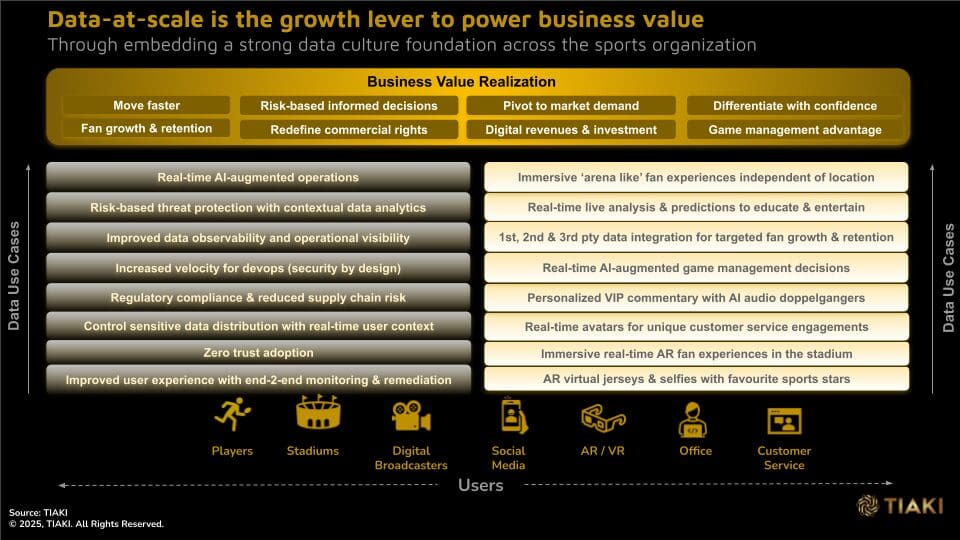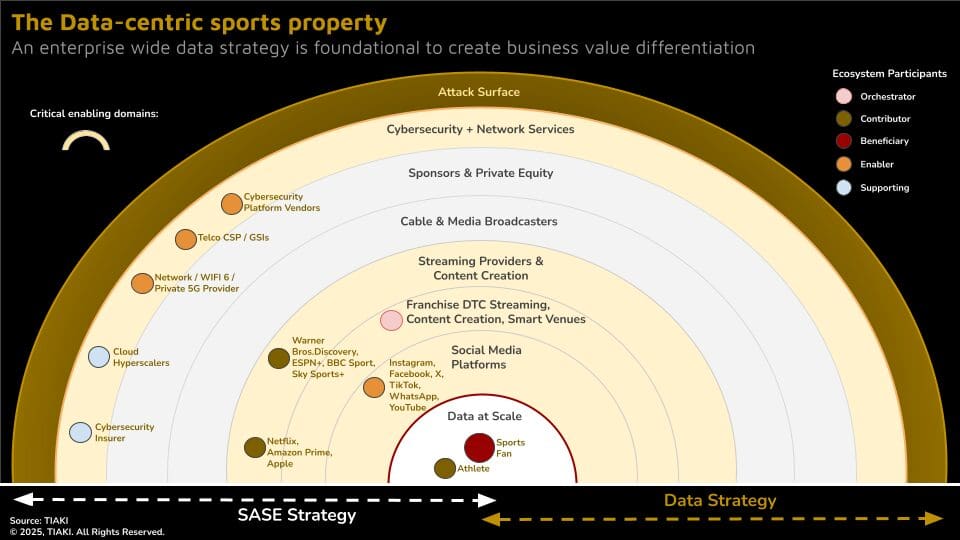Global Rugby Doesn’t Need a Rogue League, It Needs a Shift to Data Driven Fan Engagements

Sport is pivoting to new fan experiences in a digital maturing world
All sporting codes are evolving rapidly in 2025, with disruptive technology and data capabilities shaping the way fans share their immersive experiences with their favourite teams and sports stars. One of the emerging trends now impacting the global sports industry is the digital disintermediation of the sports fan engagement, which has huge implications for franchises, sports media broadcasters, social media platforms, sponsors and athletes.
Fans are increasingly bypassing traditional media channels and engaging directly with sports franchises through social media, streaming platforms, and other digital channels. In order to keep up with this shift, sports properties need to become content origination focused, prolific social media actors and experts at leveraging their 1st party data. This means creating engaging and relevant content that resonates with fans and drives personalised interaction and loyalty.
European media rights is not the ticket to revenue growth
Rugby has reached a critical inflexion point in Europe, where the over-reliance on media rights as the key driver for long-term revenue growth is waning. The market has reached a saturation point with its existing offerings and must now consider new data-driven digital levers and ecosystem partnerships for growth. However, there are significant hurdles in the short term to achieve value creation due to the lack of data and digital maturity in the industry.
All actors in the dynamically changing sports value chain will need to become data centric organisations to compete ‘off the field’ in an increasingly crowded global marketplace for sports fan engagement and loyalty. ‘Secure data-at-scale’ will be paramount to even enter the race.
Rugby rebel league or a digital-data revolution?
Rugby Union is facing a potential fundamental disruption with the emergence of a proposed “global rebel league.” While the allure of fresh investment and lucrative opportunities for players may seem enticing, it is essential to consider whether rugby truly needs a rogue, rebel league to thrive. The sport’s biggest strength lies in its local club, regional, and national identity, which forms the foundation of its dedicated fan base. However, the lack of immersive real-time digital experiences for Gen Z and Gen Alpha fans, poses a significant risk of losing them to other sporting codes like the NFL, NBA, and football.
In today’s digital age, where technology plays a crucial role in engaging fans and enhancing their overall experience, rugby must adapt to meet the evolving needs of its audience. Based on my experience of attending England v South Africa at Allianz Stadium (Twickenham) on 16th Nov’24, elite national rugby is failing dramatically to meet the challenge. Tickets priced at minimum £119 face value (before exorbitant handling fee charges), lonq entry queues, even longer food & beverage queues, lack of functional WIFI and 5G network connectivity for all 80,000 fans and zero personalised digital offerings left me feeling completely disillusioned with the the concept of engaging, immersive fan experiences at the ‘home of rugby’. This falls well short of the smart venue fan engagement experiences and monetisation opportunities in other sporting codes in North America. And this is before England were resoundingly beaten by the reigning rugby world cup champions!! Rugby needs change.
Rather than resorting to rogue leagues, the way forward lies in adopting a data-centric mindset that prioritises first-party data and smart connected stadiums. By leveraging data analytics and technology, rugby can offer hyper-personalised, immersive digital experiences that resonate with fans and open up
new revenue streams. The recent developments in sports venues, such as the Intuit Dome and SoFi Stadium in LA, showcase the art of the possible with highly connected, digitally engaged fan experiences that set a new standard for the industry.
To ensure the success of this digital transformation in rugby, the foundation of secure ‘data-at-scale’ and Secure Access Service Edge (SASE) is crucial. By prioritising data security and 1st party data centricity, with secure, robust smart venue infrastructure, rugby can lead the way in pioneering innovative fan experiences and drive new data monetisation opportunities to acquire and retain young rugby fans. Embracing a data-centric approach not only enhances fan engagement but also enables rugby to stay competitive in a rapidly evolving sports landscape. As the sport looks towards the future, it must prioritise technology and data-driven strategies to create a sustainable and engaging fan experience that secures its position in the global sporting arena.
Rugby club franchises need to become data centric organisations
Building an effective 1st party data strategy for digital fan growth is becoming foundational for success for leading sports franchises and clubs. One only needs to look at other sectors, such as Financial Services and Telco industries, to understand how they have spectacularly failed to develop deep meaningful, personalised relationships with their customers, despite sitting on vast quantities of transactional and location-specific conversation data. This reflects an inability to leverage data-at-scale from their legacy silos.
In football, FC Barcelona remains one of the leading global football club brands on social media with 335 million followers. However, their recent €280 million sponsorship deal with Spotify failed to meet the music streaming brand’s expectations. The sponsorship collaboration provided Spotify with less than 1% of Barcelona’s followers in actual first party data for monetisation opportunities.
This highlights the reality gap which exists at many sporting organisations which is their inability to leverage 1st party data from their fan base of social media followers for monetisation and deeper, insightful engagement purposes. A customer lifetime value (CLV) centric mindset is not in place. This data immaturity is failing to meet expectations of fans, sponsors and private equity investors and also potentially undermines negotiation power in future sports media rights deals. Our earlier observations reinforce this reality:
★ 88% of C-suite sports executives admit they do not have a data strategy integrated into their business decision making 1.
★ 50% concede to commercialising less than 10% of their known audience 2.
The data challenge is broader than simply how to improve harvesting existing 1st party data. A retailing data-driven personalisation mindset is needed to leverage 1st party data with anonymised 2nd party data from global players such as Google Audiences and synthetic data generation to create large volumes of sports fan personas for algorithmic learning. Only then will highly accurate, hyper-personalization marketing campaigns become credible for targeting new potential sports fans and assisting in retaining and engaging existing fans.
Data-driven insights which enable sports properties to recognise, in advance, that a specific element of their fan base is at risk of disengagement, and then proactively address this with personalised campaigns to neutralise the churn risk, should become standard. This data-centric shift needs to be embraced quickly by rugby franchises and leagues to drive stickiness, international growth and monetisation outcomes.
Data-centricity is foundational to grow the rugby fan base
Implementing a data-centric mindset to enhance fan experiences involves a strategic approach that leverages technology, analytics, and fan engagement initiatives. Here are some key steps that rugby can take to effectively implement a data-centric mindset:
1. Collect and Analyse Fan Data:
Rugby organisations can start by collecting data on fan behaviour, preferences, and interactions across various touchpoints, such as ticket purchases, merchandise sales, and digital platforms. By analysing this data, they can gain valuable insights into fan demographics, interests, and engagement patterns.
2. Personalised Content and Experiences:
Utilise the data collected to create personalised content and experiences for fans. This can include targeted marketing campaigns, customised offers, and tailored digital content that resonates with different fan segments. By delivering personalised experiences, rugby can enhance fan engagement and loyalty.
3. Smart Connected Stadiums:
Implement smart technologies in stadiums to enhance the fan experience. This can include features like mobile apps for in-seat ordering, interactive displays, and real-time updates on player statistics. By creating a connected stadium environment, rugby can offer fans a seamless and immersive experience during matches.
4. Fan Engagement Platforms:
Develop digital platforms that facilitate fan engagement and interaction. This can include social media campaigns, fan forums, and virtual events that bring fans together and foster a sense of community. By creating opportunities for fans to connect and engage with the sport, rugby can build a loyal and dedicated fan base.
5. Data Security and Compliance:
Prioritise data security and compliance to protect fan information and ensure trust. Implement robust data security measures, such as encryption and access controls, to safeguard fan data from breaches. By maintaining data privacy and security, rugby can build credibility and trust with fans.
6. Continuous Improvement:
Continuously monitor and analyse fan data to track the effectiveness of initiatives and identify areas for improvement. Use feedback from fans to refine strategies and enhance the overall fan experience. By adopting a data-driven approach, rugby can adapt to changing fan preferences and trends in real-time.
By embracing a data-centric mindset and leveraging technology and analytics, rugby can create personalised, immersive, and engaging fan experiences that drive fan loyalty, increase revenue, and position the sport for long-term success in the digital age.
Secure data-at-scale becomes critical for success
Rugby franchises will need to grow their data strategy maturity to have the correct governance and guard rails in place to deliver this ‘data-at-scale’. The challenge, however, does not stop here. Crucially, this data must be secure. Leading organisations are recognising this vital requirement and are now starting to deploy market best practice Secure Access Service Edge (SASE) solutions to minimise their cybersecurity data risk.
SASE accelerates business value realization for rugby franchises
Implementing a comprehensive SASE strategy across all aspects of a rugby club franchise should not be regarded as a defensive, technology centric cost burden. With correctly deployed SASE use cases, it becomes a fundamental business enabler to catalyse revenue multiplier growth.
Below we highlight 3 business value realisation areas which benefits from a SASE data centric approach:

1. Move Faster – Pivot to Market Demand
With a robust network cybersecurity culture deployed, based on SASE, there is increased velocity for development teams to move quickly, with confidence, for their software development cycles. Security by design is embedded at the start of all development projects. This capability facilitates faster time to market and ability to pivot to latest and potentially disruptive new market demands from fans. This enables improved differentiation and competitiveness.
2. Risk-based Informed Decisions
SASE provides the foundation for secure data-at-scale across the whole organisation. With improved data observability and greater operational visibility, decision makers are able to make better, more-informed decisions impacting the business or the network or the infrastructure or the supply chain.
Shifting to risk-based threat protection with contextual data analytics provides for a more targeted, cost efficient approach to critical operations which improves the business case profile and profitability for business use cases.
Additionally, by removing historical data silos to create secure data-at-scale, there is a greater volume of data available for algorithms to provide AI-augmented decision making to improve the quality of operational decisions. This shifts human operational focus to high-end decision making and enables manual, commodity tasks to be automated. Further improving accuracy, whilst reducing risk and cost to the business. Leading adopters can look to achieve real-time AI-augmented operations as their future target state.
3. Differentiate with Confidence – Fan Growth and Retention
Shifting to a data-driven culture to drive hyper-personalised fan engagements and content creation is becoming critically important in the increasing crowded digital sports marketplace. The ability to grow 1st party data from highly targeted fan acquisitions globally and then continue to remain relevant to this fan base to avoid churn is becoming key for long term sustainable revenue growth.
To date, most sports franchises have struggled to effectively monetize their 1st party data assets across the customer lifetime value cycle. SASE will help to accelerate this pivotal shift by catalysing the secure deployment of data for:
★ Immersive ‘arena like’ fan experiences independent of location
★ Real-time live analysis and predictions to educate, entertain and continuously engage with fans
★ The integrated use of 1st party data with anonymised 2nd party data (Google Audiences), with 3rd party data and synthetic data to create highly accurate fan personas for personalised outbound fan acquisition and retention campaigns
★ Real-time avatars for unique digital immersive experiences and customer service engagement superior expectation delivery
★ Real-time fan augmented reality (AR) fan experiences in the stadium.
Additionally, a correctly deployed holistic SASE deployment will ensure that all of the above are seamlessly integrated to continue to seamlessly deliver superior data-driven sports fan experiences.
Safeguarding data and driving scalability:
Ensuring ‘data-at-scale’ and Secure Access Service Edge (SASE) provides the foundation crucial for rugby to successfully implement data-driven strategies and enhance fan experiences. Here are some key measures that rugby clubs can take to safeguard data and ensure scalability:
1. Data Encryption and Access Controls:
Implement robust data encryption techniques to protect sensitive fan information from unauthorized access. Utilize access controls to restrict data access based on user roles and permissions, ensuring that only authorized personnel can view and manipulate data.
2. Data Governance and Compliance:
Establish data governance policies and procedures to ensure that data is managed and used in compliance with regulations and industry standards. Regularly audit data practices to identify and address any compliance gaps or vulnerabilities.
3. Cloud Security:
If utilizing cloud services for data storage and processing, ensure that cloud security measures are in place to protect data from cyber threats. Implement multi-factor authentication, data encryption, and regular security audits to mitigate risks associated with cloud storage.
4. Scalable Infrastructure:
Invest in scalable infrastructure that can accommodate the growing volume of data generated by fan interactions and engagements. Utilize cloud-based solutions or scalable databases to ensure that the infrastructure can expand to meet increasing data storage and processing demands.
5. Network Security:
Implement robust network security measures to protect data in transit and prevent unauthorized access. Utilize firewalls, intrusion detection systems, and secure VPN connections to secure network communications and data transfers.
6. Incident Response Plan:
Develop an incident response plan to effectively respond to data breaches or security incidents. Establish protocols for detecting, containing, and mitigating security incidents to minimize the impact on fan data and organizational operations.
7. Regular Security Audits:
Conduct regular security audits and assessments to identify vulnerabilities and weaknesses in the data infrastructure. Address any security gaps promptly and implement security patches and updates to mitigate risks.
8. Employee Training:
Provide comprehensive training to employees on data security best practices and protocols. Educate staff on the importance of data security, privacy, and compliance to ensure that data handling practices align with security standards.
By implementing these measures and prioritizing data security and scalability, rugby can build a strong foundation for success in leveraging data-driven strategies to enhance fan experiences, drive revenue growth, and maintain a competitive edge in the sports industry.
The C-suite can pivot confidently to new data-driven business models with an effective SASE strategy
A SASE strategy is fundamental in reducing cybersecurity risk by ensuring C-suite ownership and awareness on the risk to the business. It is crucial to increase top-level buy-in to address the evolving cybersecurity threat landscape, especially with the transition to digital enterprise and next-generation
technologies. Many sporting organisations are ill-prepared to respond to the evolving AI-augmented threats, including 3rd party supply chain risks, necessitating the need for the C-suite to elevate network cybersecurity as a senior leadership priority.
By making SASE and network cybersecurity a board-level agenda item, with proper oversight and governance, companies can align their leadership, their investment priorities and commit to enhancing digital resilience against the AI-augmented cybercriminal risks, including supply chain risks, through improved cybersecurity capabilities and gap identification.
This strategic alignment and prioritisation of risk-based controls, based on business understanding, are essential components of a SASE strategy to effectively manage network cybersecurity risks whilst enabling monetisation of creative content and data assets.

Conclusion: Rugby’s Survival Hinges on Data-Driven Fan Engagements
In today’s hyper-competitive digital sports landscape, dominated by tech giants and personalized experiences, rugby must embrace a data-driven, fan-centric approach to thrive. Traditional models, reliant on media rights deals, are no longer sufficient.
Rugby clubs must become content creators, leveraging social media and first-party data to build direct relationships with fans. This involves creating engaging content, personalizing experiences, and fostering loyalty.
Data is crucial. By becoming data-centric organizations, rugby club franchises can compete effectively in the global sports market for fan attention, sponsorships, and streaming partnerships. Securing and utilizing data effectively will be key for success.
Key Takeaways:
★ Data-driven approach: essential for survival in the digital age.
★ Fan-centric focus: Build direct relationships with fans through engaging, authentic content and personalized, relevant experiences.
★ Digital transformation: Move beyond traditional media rights models.
★ ‘Secure data-at-scale’ with SASE: will be paramount to even enter the race to compete.
★ Trust is non-negotiable.
- Only 2% of UK sports properties expecting major media rights growth in next five years – SportsPro
(sportspromedia.com) ↩︎ - Only 2% of UK sports properties expecting major media rights growth in next five years – SportsPro
(sportspromedia.com) ↩︎
About the Author:

David Andrew
Founder & Managing Partner
www.tiaki.ai
[email protected]


David is the Founder & Managing Partner at TIAKI, a niche consulting practice helping executive leadership in sport make confident, informed decisions on their risks, investments and business outcomes powered by secure ‘data-at-scale’. He collaborates with bold and determined leaders in the sports ecosystem to define their data, AI and cybersecurity strategies to deliver sustainable value.
David’s vision for TIAKI is to empower sports franchise CEOs, leadership teams, sports media broadcasters and investors in the global sports industry with strategic advisory frameworks to deliver secure, pioneering digital fan experiences and new ecosystem business models to achieve breakthrough returns.
David has over 20 years of strategy and technology enabled business transformation experience, providing consulting expertise in cloud native technologies, data strategy, digital business enablement and cybersecurity strategy. He is passionate about helping talented leadership teams succeed in securely growing their differentiated business models in the data-driven, digital sports economy.
Based in Stockholm, David previously worked for IBM Consulting, EY, Accenture Strategy and Orange Business. He studied Chemistry at Durham University and holds an MBA from Trinity College, Dublin Business School.
Copyright © 2025 TIAKI.
All rights reserved. TIAKI and its logo are registered trademarks of TIAKI.
Search


